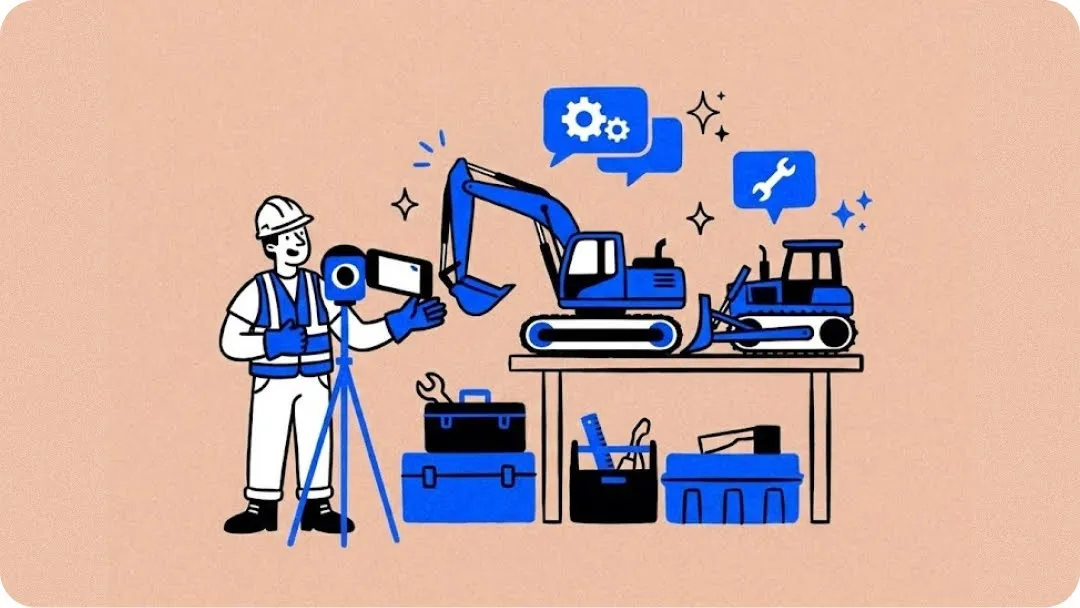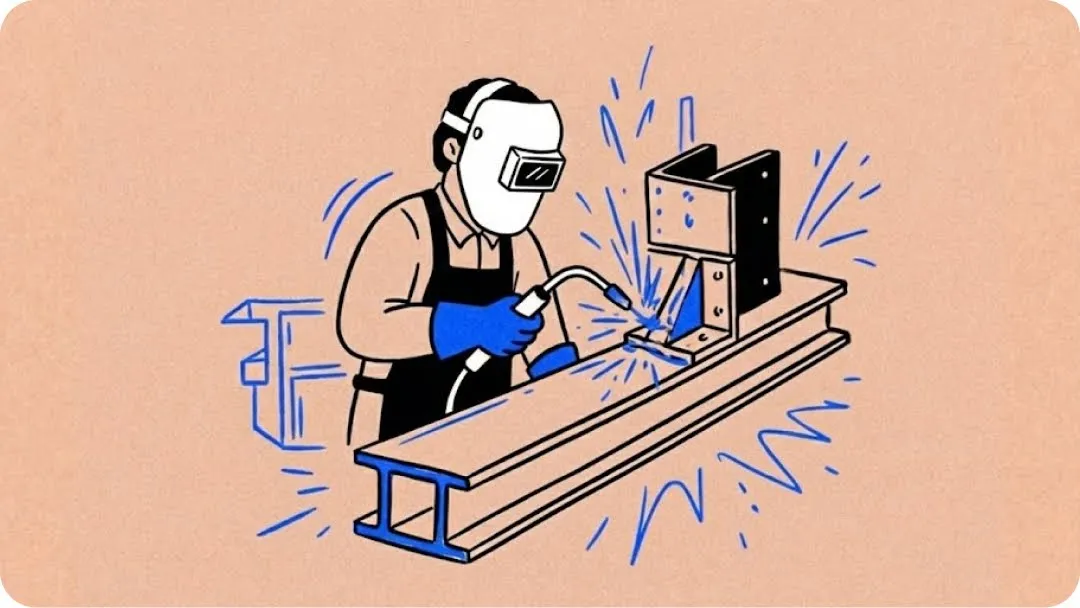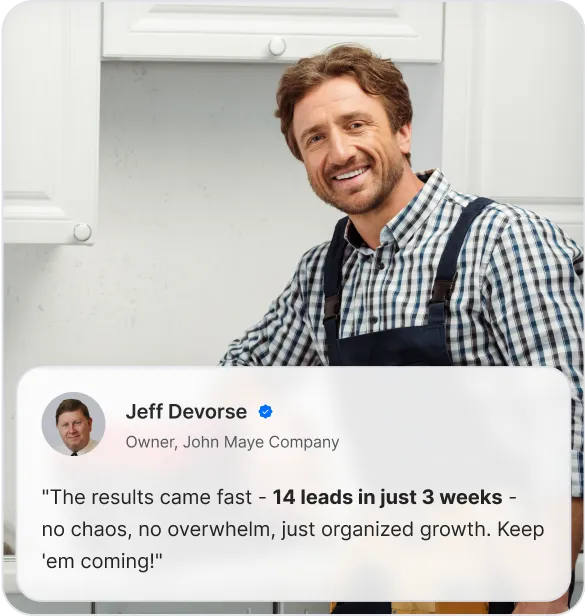You make incredible products at your facility. Too bad your customers will never know.
Your parts meet spec every time. You deliver on time. Your customers trust you. And when you quote a deal, you always provide what you promised.
So why did you lose that last big contract to a company with worse reviews than yours?
Here's what actually happened: The buyer called for quotes from three suppliers. Your competitor had a clear value proposition ready. They said, "We deliver precision parts with 99% on-time delivery, 2 days faster than the industry standard."
Your sales team said: "We've got state-of-the-art CNC machines and we've been doing precision machining for over 20 years. Our quality control is really thorough, and we work with all kinds of materials."
You're not wrong. But your competitor focused on the buyer's outcome. You focused on your process. And you lost the deal.
When the next customer asked for pricing, your competitor sent a quick text with numbers and delivery time. You spent two days preparing a formal proposal with technical specifications. Your competitor closed the deal before you even reached the decision stage.
This keeps happening because you're treating sales completely differently from how you run the rest of your business.
You wouldn't run your production floor on gut instinct and hope. Every job has specifications, every process has procedures, and every outcome is measurable. Here’s what you need to keep in mind.
Build a Sales System That Works Like Your Production Floor

Most manufacturers treat sales as if it doesn't need the same rigor as everything else.
Maybe you handle everything in sales yourself, jumping between production issues and customer calls. Or you have a star salesperson who works entirely from memory but can't teach anyone else what he knows.
When your sales rep gets busy, overwhelmed, or takes a vacation, your entire revenue stream stops and falls behind. New inquiries pile up. Follow-ups get forgotten. Hot prospects go cold while you're putting out fires on the production floor.
That's not a sales process—that's a single point of failure.
Some manufacturers that have doubled their sales have built systems that work whether their best salesperson is available or not. Their teams know exactly what to say in conversations. They have schedules for follow-ups. They track and nurture prospects systematically.
The goal isn't to replace good salespeople; it's to give them a system that makes success predictable.
Here's exactly how to build that foundation.
#1 Create a Value Message That Buyers Can Actually Understand
You probably tell people, “We make precision parts” or “We do custom fabrication.”
That’s great to know. But that’s not a reason to buy. Every other manufacturer says the same thing. How can you stand out?
Today’s buyers want to know exactly what you do, but even more importantly, why they should choose you over the others.
Craft one simple value statement that connects to your buyer’s needs. This is not just any marketing fluff; it can be a clear message that says: “We deliver pumps with 99% uptime reliability, shipped within 48 hours.”
Here’s How You Do It: Think about your best customer. What do they care about most? Speed? Cost? Reliability? Speak about that in one sentence, connecting what you do to what they want. Use this line everywhere, on your website, brochures, WhatsApp messages, and email signature. Or maybe even as your Tagline.
Now that you have thought of building a clear value message that resonates with buyers, you need to back it up with action.
Because here's the reality: Even the most compelling value proposition won't matter if you can't respond when opportunity knocks. And in today's fast-moving market, opportunity doesn't wait around...
#2 Speed Up Your Quote Response Time
If you take three days to quote, your buyer has already moved on.
Today's procurement managers don't wait around. They're comparing multiple suppliers, and whoever responds fastest usually wins. While you're crafting the perfect email response or personalizing a brochure for them, someone else just sent a quick quote and got the order.
Instead, start treating quotes like conversations, not contracts.
The fastest manufacturers are using tools that their buyers already check constantly, such as their website, WhatsApp, SMS, and even quick phone calls. No fancy software needed. Just immediate, personal responses that feel human.
Try these simple steps.
Step 1: Create three message templates you can send instantly:
- Quick response: "Got your request for [product]. Sending specs and pricing now, any specific requirements I should know?"
- The quote: "Here's pricing for [product]: [price] with [delivery time]. Happy to answer any questions."
- Follow-up: "Wanted to make sure you got the quote. Ready to move forward or need anything adjusted?"
Step 2: Ask your sales team to save these on their phone. When an inquiry comes in, they can respond in under a minute instead of waiting until they’re back at their computer. Also, set a phone reminder to follow up in 2-3 days. Not next week, this week.
The goal isn't to be pushy. It's to be present when your buyer is making decisions.
While your competition is still "preparing comprehensive proposals," you're already building relationships and closing deals.
Speed gets you in the conversation, but what keeps you there? What turns that quick response into a closed deal?
It's not just about being fast; it's about speaking their language. You see, there's often a disconnect between what we know as manufacturers and what buyers actually care about.
#3 Turn Your Production Expertise Into Sales Conversations

You are familiar with tolerances, lead times, and material properties. Your buyers care about uptime, cost savings, and project deadlines.
This disconnect kills more manufacturing deals than price ever will.
When a prospect asks about your CNC capabilities, you probably start talking about spindle speeds and tool changes. But what they really want to know is: "Can you keep my production line running?"
The manufacturers who consistently win deals have learned to translate technical excellence into business outcomes that buyers actually care about.
For every technical capability you mention, add the business benefit.
Instead of: "We maintain +/- 0.001" tolerance"
Say: "We maintain +/- 0.001" tolerance, which eliminates costly rework and keeps your assembly line moving"
Collect specific customer success stories.
"We delivered 500 units two days early, helping ABC Company avoid a $50K penalty".
"Our quality control caught a design issue that saved XYZ Corp three weeks of downtime"
Use their industry language, not yours
If they say "minimize disruption," don't say "optimize efficiency".
If they say "budget constraints," don't say "cost-effective solutions"
Your technical expertise is your competitive advantage. But it only becomes valuable when buyers understand how it solves their real problems.
When you master the art of translating technical expertise into business benefits, something amazing happens.
Your customers start to truly understand your value. And when customers really get what you do for them, they naturally want to share that experience with others facing similar challenges. The question is: are you making it easy for them to do that?
#4 Create a Referral System That Actually Works
Your best customers know exactly who else needs what you make. But they're not referring to anyone because you never asked properly.
Most manufacturers treat referrals like luck - hoping satisfied customers will somehow remember to mention their name.
Meanwhile, they're missing the most qualified leads possible: prospects that come pre-recommended by people who've seen your work.
The problem isn't that your customers don't want to help. It's that you're making it too hard for them to help you.
Time your ask perfectly
Right after successful delivery: "Now that this project's complete and running smoothly, who else do you know facing similar challenges?"
Also during regular check-ins: "We've expanded capacity - are there other companies in your network that might need our services?"
Make it specific and easy
Instead of: "Know anyone who might need manufacturing?"
Ask: "Do you know other maintenance managers dealing with long lead times on replacement parts?"
Offer to do the work
"If you're comfortable sharing their contact info, I'll reach out and mention you suggested we connect"
"Or I can send you a quick email you can forward to them"
Close the loop and show appreciation
Update the referrer on results: "Thanks to your introduction, we're now working with ABC Company"
Send a small thank you - not a commission, just acknowledgement
Use industry connections systematically
Trade shows: "Who else should I be talking to here?"
Supplier relationships: "Which of your other customers might benefit from what we do?"
Professional associations: Turn casual conversations into subtle business introductions
One quality referral is worth more than 100 cold calls. Your satisfied customers are your best sales team - you just need to activate them properly.
Having satisfied customers actively referring new business to you is powerful. But what happens between referrals? What about those weeks or months when your phone isn't ringing with recommendations?
Here's the thing—while you're waiting for the next referral to come in, there are potential customers out there actively searching for what you do. Maybe, even at 2am on a Sunday. The question is: when they find you, are you ready to capture that interest?
#5 Build Your 24/7 Digital Sales Engine
Your website is your biggest missed opportunity.
While you are reading this, potential customers are already searching for what you sell. They're comparing suppliers online, reading reviews, and making shortlists. But when they find your website, what happens? Probably nothing.
Most manufacturing websites are digital brochures, static pages with basic company info and a "contact us" form that feels like shouting into the void.
Meanwhile, your competitors are capturing leads, nurturing prospects, and converting visitors into customers.
If you want leads coming in without your sales team doing a cold reach, try these methods.
1. Create a website with content on what your buyers want to know
Instead of hoping visitors will call, give them something valuable in exchange for their contact information. A capability guide, pricing worksheet, or technical specification sheet that can be downloaded instantly.
When someone downloads your guide or requests information, follow up automatically with helpful content. Not sales pitches, useful information that builds trust and keeps you top-of-mind.
2. Make it easy to take the next step.
Clear calls-to-action, simple contact forms, or RFQs. Remove every possible barrier between interest and action.
Help them with the next steps. Your sales team can also send out product brochures or solid information on a deal that you gave other customers.
3. Track what's working and improve it.
Know which pages convert visitors, which pages get downloaded, and which follow-up messages get responses.
If setting up lead generation systems is simple. All you need to keep in mind is how your business should be generating leads around the clock.
Here’s how you can do it.
Create Your Digital Sales Infrastructure

You need good content that attracts buyers, product specs, pricing, and pages that convert visitors, tracking systems that show what's working, and follow-up processes that turn inquiries into orders.
Create blog content that attracts your target audience and answers their questions through informative and engaging content.
Optimize your service and product pages to convert more visitors.
Set up Google Ads that target serious buyers, and implement tracking systems so you know exactly which leads are coming from where.
Most importantly, make sure nothing falls apart. That's exactly where Gushwork helps you seal the crack.
We help in turning manufacturing websites into lead-generating machines.
We specialize in providing top-quality content where every lead and inquiry gets tracked, and you get clear reports on what's driving real business results.
While you focus on manufacturing excellence, we focus on making sure your expertise gets found by the right buyers at the right time.
Talk to us for a free trial here!
FAQs
1. How can a manufacturing company increase sales quickly?
To increase sales quickly, manufacturers should focus on improving their sales process by speeding up responses to inquiries and simplifying quotes. Targeting high-value clients and strengthening relationships with existing customers can also drive faster revenue. Additionally, leveraging digital channels, like a professional website and LinkedIn outreach, helps reach new buyers. Automating follow-ups ensures leads don’t get cold. Small, consistent improvements in communication and process often bring quick wins.
2. What are effective sales strategies for manufacturing businesses?
Effective sales strategies for manufacturers combine understanding buyer needs with clear product differentiation. Prioritize creating a strong value proposition that highlights how your product solves specific problems. Use data-driven targeting to identify high-potential clients, and implement consistent follow-ups. Incorporate digital tools like CRM systems or simple messaging templates for speed. Also, build trust with testimonials and case studies. A mix of relationship-building and process automation often yields the best results.
3. Why are my manufacturing sales declining despite good products?
Good products alone don’t guarantee sales growth. Declines often happen when sales efforts rely too much on old methods like trade shows or word of mouth, without systematic follow-up. Buyers today expect faster responses, clearer value messaging, and easy online access to product info. Without a structured sales process and digital presence, potential leads can slip away. Assess where communication or process bottlenecks exist and adopt simple tools to keep your sales pipeline active.
4. How can digital marketing help increase manufacturing sales?
Digital marketing expands your reach beyond traditional channels. A well-designed website with clear product info and calls to action can turn visitors into leads. Content marketing, like blogs, videos, and case studies, builds credibility and attracts search traffic. Social media, especially LinkedIn, helps connect with procurement professionals and decision-makers. Email and messaging campaigns automate follow-ups. Digital marketing works best when integrated with sales efforts, ensuring no lead goes unnoticed.
5. What role does follow-up play in increasing manufacturing sales?
Follow-up is critical in manufacturing sales because decisions often take time and require multiple touchpoints. Many leads are lost simply because no one followed up promptly or consistently. A simple follow-up system—whether by phone, email, or messaging apps, keeps your product top of mind and answers buyer questions. Automating reminders or message templates ensures reps never miss opportunities. Timely, relevant follow-up builds trust and moves leads closer to a purchase.



















.webp)








.webp)

.svg)


.svg)
.svg)
.svg)




.svg)


